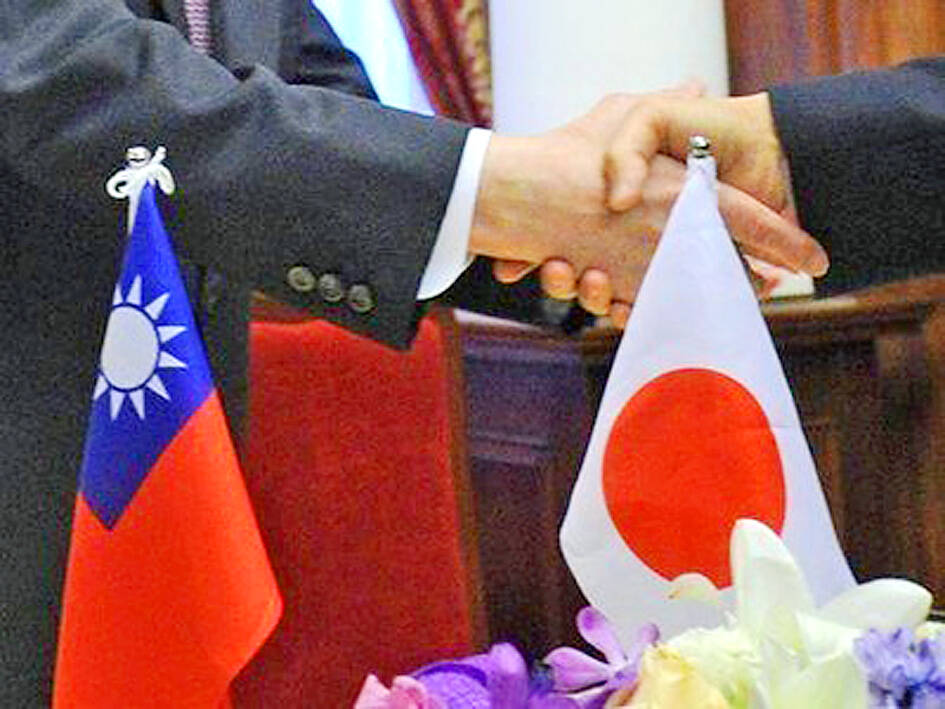Seventy percent of Japanese view Taiwan as an independent country and support establishing formal diplomatic relations between the nations, a poll published yesterday by a Taipei-based think tank showed.
The Indo-Pacific Strategic Think Tank (IPST) worked with the Japanese Sankei Shimbun’s polling company to conduct a survey on Japanese public opinion of Taiwan and cross-strait relations.
The survey showed that 71.1 percent of Japanese respondents said they support establishing diplomatic ties with Taiwan, 71.2 percent view Taiwan as an independent nation and 55 percent feel closest to Taiwan among nine Asian countries.

Photo: CNA
When asked which person most represents Taiwan, 53.8 percent chose late singer Teresa Teng (鄧麗君), followed by retired baseball star Kuo Tai-yuan (郭泰源), who pitched for Japan’s Seibu Lions from 1985 to 1997, at 18.6 percent and late president Lee Teng-hui (李登輝) at 16.7 percent.
Four percent of respondents said President William Lai (賴清德), the poll showed.
Regarding cross-strait relations, only 8.2 percent of participants said they viewed Taiwan as part of China and 20.6 said they were unsure about the issue.
Fifty percent said they believe that a war would not occur in the next decade, 23.6 percent think conflict is likely and 26.4 percent remain neutral, the poll showed.
On late Japanese prime minister Shinzo Abe’s statement that “a Taiwan contingency is a contingency for Japan,” 38.3 percent said they supported it, 30 percent opposed it and 31.8 percent did not reply either way, it showed.
If a conflict were to break out, 52.1 percent said they expected that the US would support, but not directly intervene, 39.1 percent expect a US intervention and 8.9 percent believe the US would not assist Taiwan.
As for Japan’s role in a hypothetical conflict, 46.6 percent of respondents said they believed Japan should provide legally permissible support, 41.4 percent support economic sanctions and 12 percent believe Japan should not intervene at all, the poll showed.
The survey found that 40.6 percent of respondents said they believe Japan should bolster economic engagement with Taiwan, while 26.7 percent said they prefer prioritizing security cooperation, 16.1 percent support emphasizing cultural exchanges and 10.2 percent prefer focusing on political relations.
Regarding what they like and dislike most about Taiwan, the majority said they liked Taiwan’s proximity to Japan and the friendliness of Taiwanese, such as how it assists Japan during natural disasters, while 53.8 percent cited Taiwan’s chaotic traffic as a major drawback, the poll showed.
The survey was conducted on Sept. 21, with more than 3,000 adult respondents from eight major cities, IPST said, adding that the poll consisted of 14 single-choice questions, asked over the telephone.
The IPST is a new research organization founded by Taipei-based political commentator Akio Yaita that takes inspiration from Abe’s Indo-Pacific Strategy to highlight Taiwan’s democratic freedoms and its strategic importance to regional peace and stability.

MAKING WAVES: China’s maritime militia could become a nontraditional threat in war, clogging up shipping lanes to prevent US or Japanese intervention, a report said About 1,900 Chinese ships flying flags of convenience and fishing vessels that participated in China’s military exercises around Taiwan last month and in January have been listed for monitoring, Coast Guard Administration (CGA) Deputy Director-General Hsieh Ching-chin (謝慶欽) said yesterday. Following amendments to the Commercial Port Act (商港法) and the Law of Ships (船舶法) last month, the CGA can designate possible berthing areas or deny ports of call for vessels suspected of loitering around areas where undersea cables can be accessed, Oceans Affairs Council Minister Kuan Bi-ling (管碧玲) said. The list of suspected ships, originally 300, had risen to about 1,900 as

Japan’s strategic alliance with the US would collapse if Tokyo were to turn away from a conflict in Taiwan, Japanese Prime Minister Sanae Takaichi said yesterday, but distanced herself from previous comments that suggested a possible military response in such an event. Takaichi expressed her latest views on a nationally broadcast TV program late on Monday, where an opposition party leader criticized her for igniting tensions with China with the earlier remarks. Ties between Japan and China have sunk to the worst level in years after Takaichi said in November that a hypothetical Chinese attack on Taiwan could bring about a Japanese

Right-wing political scientist Laura Fernandez on Sunday won Costa Rica’s presidential election by a landslide, after promising to crack down on rising violence linked to the cocaine trade. Fernandez’s nearest rival, economist Alvaro Ramos, conceded defeat as results showed the ruling party far exceeding the threshold of 40 percent needed to avoid a runoff. With 94 percent of polling stations counted, the political heir of outgoing Costa Rican President Rodrigo Chaves had captured 48.3 percent of the vote compared with Ramos’ 33.4 percent, the Supreme Electoral Tribunal said. As soon as the first results were announced, members of Fernandez’s Sovereign People’s Party

MORE RESPONSIBILITY: Draftees would be expected to fight alongside professional soldiers, likely requiring the transformation of some training brigades into combat units The armed forces are to start incorporating new conscripts into combined arms brigades this year to enhance combat readiness, the Executive Yuan’s latest policy report said. The new policy would affect Taiwanese men entering the military for their compulsory service, which was extended to one year under reforms by then-president Tsai Ing-wen (蔡英文) in 2022. The conscripts would be trained to operate machine guns, uncrewed aerial vehicles, anti-tank guided missile launchers and Stinger air defense systems, the report said, adding that the basic training would be lengthened to eight weeks. After basic training, conscripts would be sorted into infantry battalions that would take